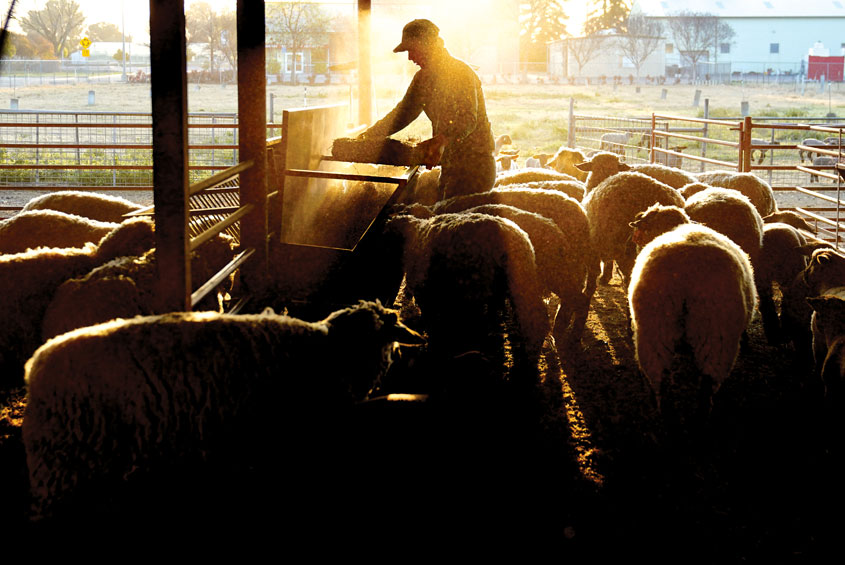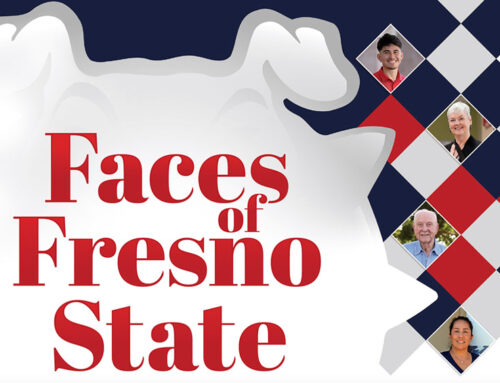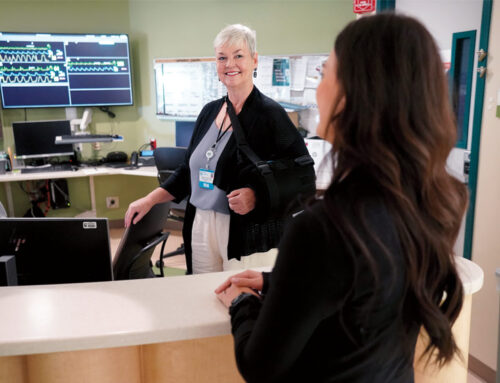A Land of Opportunity
A 1,000-acre living lab offers a one-of-a-kind college experience for ag students
By Eddie Hughes
For some college students, their campus becomes a home away from home. For agricultural education student Jonathan Moules, school, work and home all blended together.
Moules moved into his new home on the University farm in August, smack dab in the middle of the COVID-19 pandemic that turned campus into a ghost town.
While the majority of students, faculty and staff adjusted to working remotely during the 2020-21 school year, about 80 ag students continued to work on the 1,000-acre University farm — caring for animals, tending to crops and putting products on the shelves of the Gibson Farm Market and other local retailers.
“The expression ‘rain or shine’ might as well be replaced with ‘rain, shine or COVID-19’ because our world will not simply stop eating for a day so that farmers can get away from the weather or even a pandemic,” says Moules, a senior from Delhi who graduated from Turlock High School and Modesto Junior College before transferring to Fresno State. “Being on campus during the pandemic reminds me of a deserted island. A minimal number of students, no events and online instruction has definitely been a change in my life but, at the same time, it has allowed me to focus more on my job at the sheep unit.”
Moules, or “Farmer Jonathan” if you will, has been around agriculture all his life. His parents began growing almonds after immigrating to Central California from the Azores Islands off the coast of Portugal.
But his role at the sheep unit is new to him. He lives on site and helps care for over 100 Hampshire-Suffolk sheep raised for livestock exhibitions and meat consumption. He says he was anxious at first about the opportunity, but he knew it would be an important part of his education as he prepares to be a high school agriculture teacher after graduation.
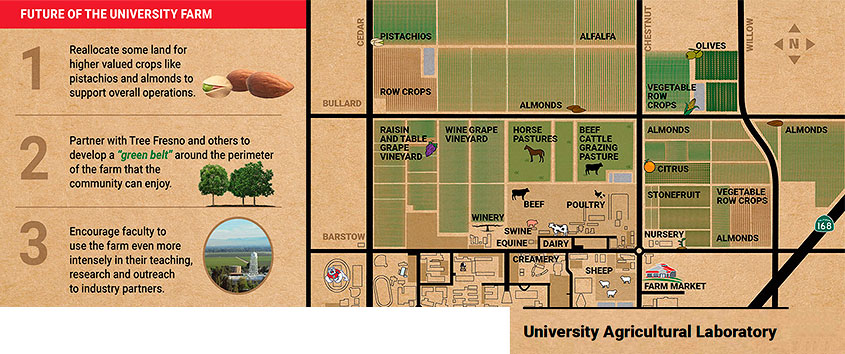
A Fruitful Vision
There are 23 different enterprises on the campus farm, ranging from the sheep unit to the dairy to the winery. Fresno State farm manager Mark Salwasser says units like the sheep and swine — while not the most profitable entities — are key to attracting young students who are introduced to ag through raising livestock for the fair.
Nestled in the heart of the most agriculturally rich region in the world, Fresno State has long celebrated its farming roots and expertise while priding itself as one of the top universities for future farmers.
“The University Agricultural Laboratory is a hallmark of a Fresno State education in agriculture,” says Dr. Dennis Nef, dean of the Jordan College of Agricultural Sciences and Technology.
“Our students can be in a classroom learning theory and, in minutes, cross the street and be in their lab where that theory becomes reality through hands-on applications. Few other campuses in the country have a similar situation.”

Dr. Dennis Nef
Fresno State is fiercely committed to maintaining and even expanding these types of unique and diverse learning experiences for students on the campus farm, Nef says.
To ensure this in the coming years, the University has a three-pronged plan in place that includes reallocating some land for higher valued crops like pistachios and almonds, partnering with Tree Fresno and others to develop a “green belt” around the perimeter of the farm that the community can enjoy, and encouraging faculty to use the farm even more intensely in their teaching, research and outreach to industry partners.
Given the diversity of enterprises on the farm, not all units can operate at the volume necessary to be self-sustaining. “Take the dairy, for example,” which milks about 140 head of cattle per day, Nef explains. “Given the scale that we can operate, we’re never going to be able to make money on the dairy — it requires a much larger dairy to do so — but we need to have a dairy for educational purposes. So we are reallocating some of the land to higher valued crops which can make a return that will allow the overall operation to be financially sustainable.”
The Jordan College converted 36 acres of cropland to almonds in 2020 and a similar number of acres to almonds and pistachios in 2021 — much of it thanks to the generosity of community partners like Ag Soil Works, H.M. Holloway, Gar Bennett, Wolf Farming, Landmark Irrigation, Mazzei Nursery and others who donated labor and materials to help offset costs and support student success.
“By 2025, we’ll have enough almonds and pistachios in the ground to support some of these units that are a really important educational component but, due to their size, can’t sustain themselves,” Salwasser says.
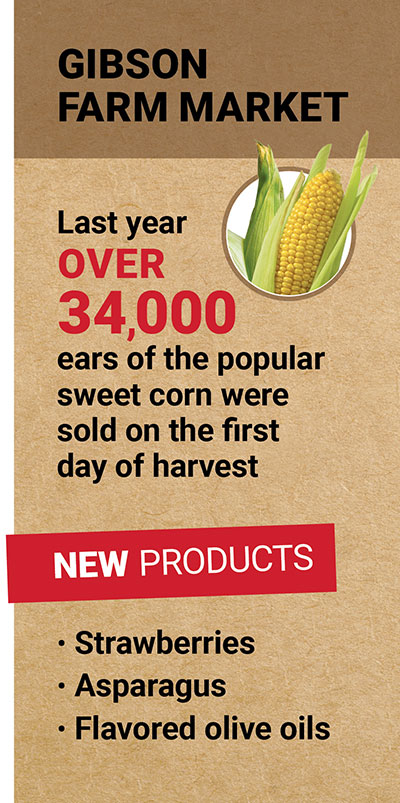 The Jordan College invites partnerships and private support to help advance the vineyard, dairy and quarter horse unit. The dairy will eventually be outfitted with robot milkers to help with efficiency.
The Jordan College invites partnerships and private support to help advance the vineyard, dairy and quarter horse unit. The dairy will eventually be outfitted with robot milkers to help with efficiency.
Of course, the farm will also continue to provide the community favorites, including the wildly popular sweet corn that draws customers from all over the Valley to line up by the dozens outside the Gibson Farm Market before sunrise on opening day. This past year, over 34,000 ears of corn were sold on the first day it arrived at the market fresh from the University farm.
The award-winning Fresno State Winery, the first commercially bonded winery ever on a college campus, is another favorite among alumni and the community. For the first time, the Tailgate Series of red, white and rosé wines are now available in convenient cans for tailgating at a football game or enjoying at a picnic or barbecue.
Brenna Pratt, who graduated in May with a bachelor’s degree in enology, established herself as a leader at the winery. Besides helping with canning, she also spent months filtering, finishing and bottling thousands of cases of wine.
“This job has taught me so much — not only about the physical and theoretical side of winemaking, but also how critical teamwork and communications is,” says Pratt, who stayed and worked on campus throughout the pandemic.
There is also a new Alumni Vintners Wine Club that offers a variety of Fresno State wines as well as two featured selections from an alumni winery such as Chateau Montelena, Toca Madera and more to come.
Consumers can look forward to other new items at the Gibson Farm Market, including hot-selling strawberries and asparagus and flavored olive oils. The Jordan College olive orchard was also recently certified organic, allowing for production of organic olive oil.
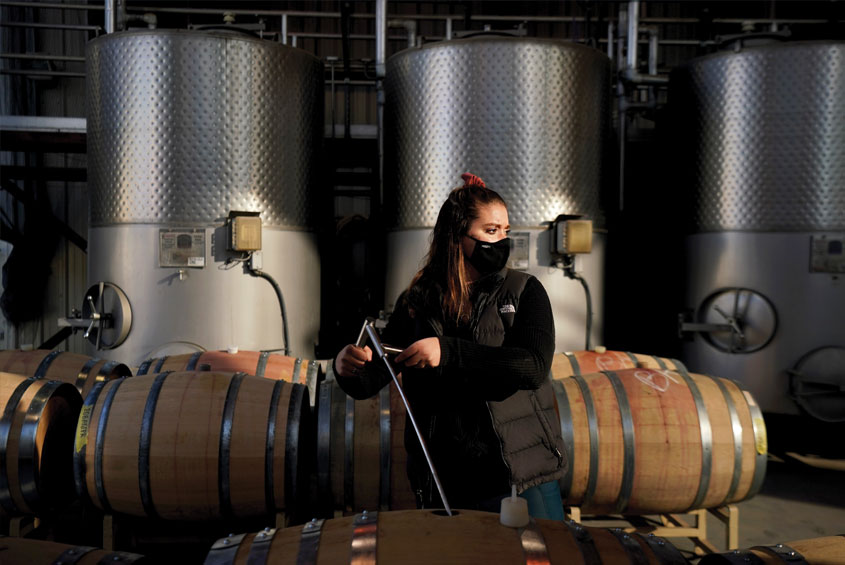
Brenna Pratt is responsible for monitoring and executing the year-long process from start to finish, and although each year brings new milestones, she takes immense pride in the smaller moments and “day in, day out learning.”
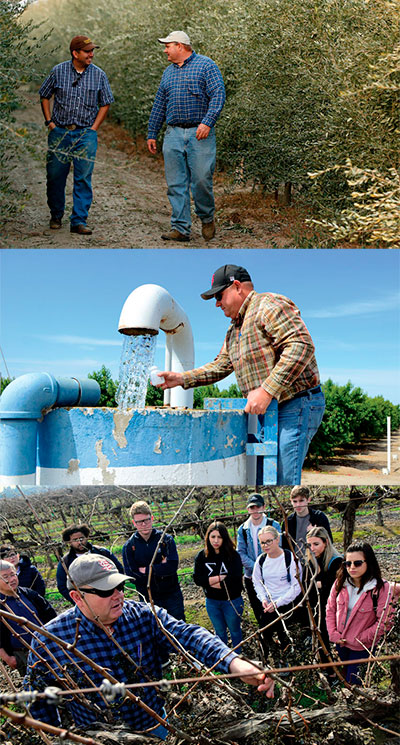
Reflecting the beauty of the region it represents, the Fresno State campus features a living laboratory, including vast vineyards and various other crops and animal units that serve as training ground for the next generation of agriculture professionals.
Farm Grown
Salwasser can attest to the value of a Fresno State agricultural education. This past May marked his 30th year on the job at Fresno State. Long before he was farm manager, he graduated from Washington Union High School in Easton and opted to work on his dad’s 140 acres of raisins rather than furthering his education.
“Mom kept telling me all summer, ‘just go try school a little bit, go try it,’” Salwasser recalls. “OK, I’m going to shut mom up and go take two classes at Kings River College (now Reedley College).”
Lo and behold, he liked it and, after two years, transferred to Fresno State and began working in the vineyard with raisins and wine grapes. Thirty years later, he’s leading the entire 1,000-acre farm.
The gratitude is palpable in Salwasser’s voice as he reflects back to how his life changed based on his mother encouraging him to pursue his education.
“I’ve been wanting to share that story with my mom, and I haven’t yet, so this is helping me do that,” Salwasser says. “I’m sure she’ll remember and probably cry or laugh — I’m not sure which.”
Student Opportunities
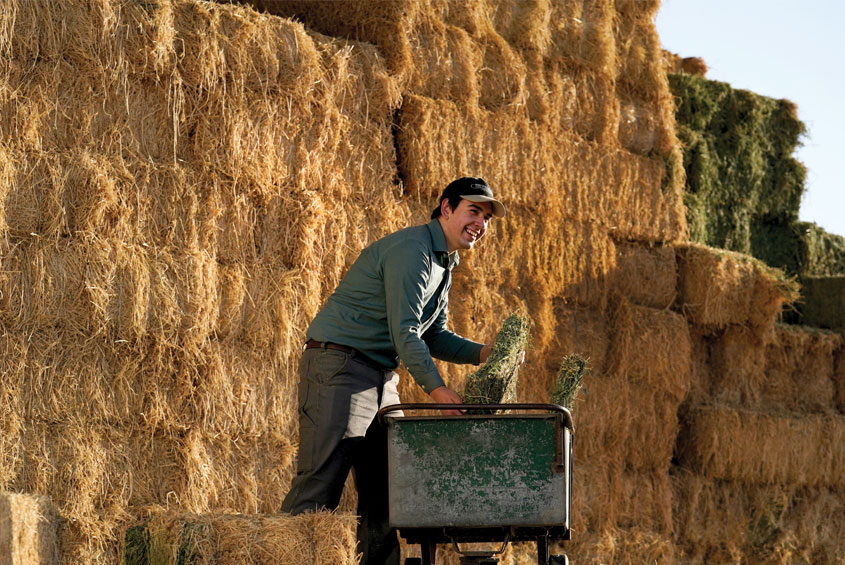
Agricultural education student Jonathan Moules typically starts his work day at Fresno State’s sheep unit at 7 a.m. He feeds the animals, performs health checks for 100-plus sheep and keeps the pens tidy.
For students pursuing careers in the food and agriculture sectors, the University farm is a vast resource filled with possibilities. It’s where students can find themselves, discover their passions and make connections that will last a lifetime.
Take it from Moules, the student working on the sheep unit. “Want to learn how to run a business? Jordan College teaches that. Want to learn how to diagnose health issues in plants and animals? Jordan College does that. Want to get involved in metalwork and build projects? Jordan College does that. Want to have a valuable experience that ensures a successful future? Jordan College does that, too.”
Moules’ typical day on the job begins with a 7 a.m. feeding, followed by health checks for all 100-plus sheep. Depending on the time of year, he checks if any ewes lambed throughout the day to ensure the health of the newborns and ewes during and after delivery. Newborns are vaccinated at a few days old to ensure a strong immune system. And then he cleans pens and sweeps up.
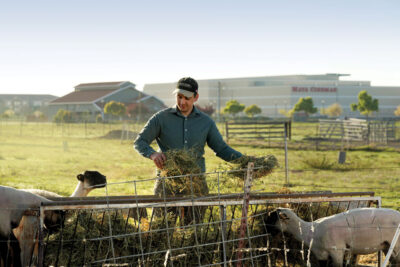
Jonathan Moules, whose parents began growing almonds after immigrating to Central California from the Azores Islands off the coast of Portugal, has been around farming his entire life. But his Fresno State education provided him many new experiences, including working on the campus sheep unit, that have helped prepare him for a career as a high school agriculture teacher.
“Working at the sheep unit has prepared me just as much to enter the agriculture teaching profession as my academic coursework has,” Moules says. “It allowed me to practice everything I’ve learned and discover what I have yet to master.”
Also valuable are the relationships students develop with industry partners. Faculty frequently arrange field trips to farms or processing plants in normal school years and invite guest speakers to visit the University farm and speak to students in their respective units.
“To take that a step further, these units grow table grapes and raisins, produce ice cream, milk or wine and then students sell the products to the community, whether it’s the Gibson Farm Market or elsewhere, such as fulfilling table grape orders for Whole Foods or wine orders for Save Mart,” Salwasser says. “The students get a taste of meeting the business public and learn how to communicate and make a sale.”
These hands-on learning experiences are essential for students who don’t grow up on a farm and may not otherwise be exposed to the industry.
“The farm is essential to our mission to educate students to be highly productive, innovative and dynamic leaders in the food and agriculture sectors, in their communities and in their families,” Nef says.
As he puts it: “We are growing productive tomorrows.”
That may be the most valuable crop of all.

